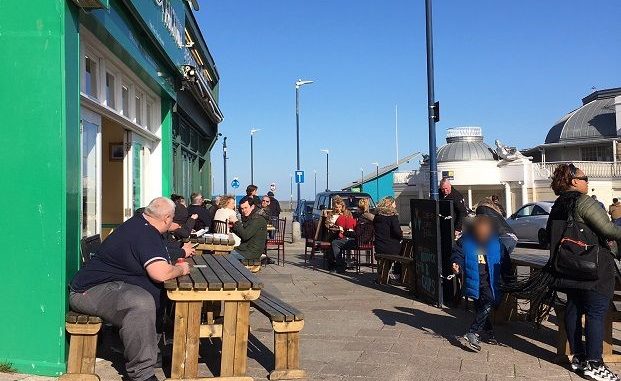
Crowds gathering on the isle’s seafront and outside pubs and cafes appear to be ignoring government advice on social distancing aimed at slowing the spread of coronavirus (Covid-19).
Despite pub and restaurant closures, the relaxation on planning rules to allow venues to operate a takeaway service has attracted crowds who are not collecting and dispersing.
As of 9am today (March 21), 72,818 people have been tested in the UK, of which 67,800 were confirmed negative and 5,018 were confirmed positive. A total of 233 patients in the UK who tested positive for coronavirus (COVID-19) have died.
In Kent 45 people are confirmed as positive for the virus – up 13 yesterday – with a further 11 in Medway.
Confirmed cases in Thanet include one at Birchington Vale, another in Westgate, and a parent of a Chatham & Clarendon grammar student as well as an uncorfirmed number being treated at QEQM Hospital.
The UK has not yet reached the peak of the virus, estimated to be some 10 weeks away, and steps to halt the spread include closures of schools, hospitality and leisure venues and the advice for social distancing and social isolation.
Despite this, and the rising death toll in affected countries such as Italy, the message is not getting through to everyone.
The scene of people gathered on the seafront was pictured by a shocked isle dentist. They said: “I’m a dentist in a high risk job and people aren’t taking it seriously. I passionately believe people need to take this seriously or we’ll be in a worse state than Italy very soon.”
Similar scenes in Whitstable have been slammed on twitter by Canterbury City Council
We’re aware of scenes of large gatherings today at some licensed premises in Whitstable. We deplore this and are working with the police, and using government regulations, to determine the action we may be able to take as the licensing authority.
— Canterbury City Council (@canterburycc) March 21, 2020
Government advice
The government has urged the public to take steps to protect themselves and the wider population from the coronavirus, including:
- Everyone to stay at home unless they need to get essential supplies such as food and medicines.
- All those able to work from home to do so, unless their work is essential.
- Only travelling if absolutely necessary – while public transport won’t stop, this should only be used for essential travel – for example by key workers to travel to and from work.
What is social distancing?
Social distancing measures are steps you can take to reduce social interaction between people. This will help reduce the transmission of coronavirus (COVID-19).
They are to:
- Avoid contact with someone who is displaying symptoms of coronavirus (COVID-19). These symptoms include high temperature and/or new and continuous cough
- Avoid non-essential use of public transport when possible
- Work from home, where possible. Your employer should support you to do this.
- Avoid large and small gatherings in public spaces, noting that pubs, restaurants, leisure centres and similar venues are currently shut as infections spread easily in closed spaces where people gather together.
- Avoid gatherings with friends and family. Keep in touch using remote technology such as phone, internet, and social media
- Use telephone or online services to contact your GP or other essential services
Everyone should be trying to follow these measures as much as is practicable.
We strongly advise you to follow the above measures as much as you can and to significantly limit your face-to-face interaction with friends and family if possible, particularly if you:
- are over 70
- have an underlying health condition
- are pregnant
This advice is likely to be in place for some weeks.
Stay at home if you have either:
- a high temperature – you feel hot to touch on your chest or back
- a new, continuous cough – this means you’ve started coughing repeatedly
Do not go to a GP surgery, pharmacy or hospital.
You do not need to contact 111 to tell them you’re staying at home.
Testing for coronavirus is not needed if you’re staying at home.
- if you have symptoms, stay at home for 7 days
- if you live with other people, they should stay at home for 14 days from the day the first person got symptoms
If you live with someone who is 70 or over, has a long-term condition, is pregnant or has a weakened immune system, try to find somewhere else for them to stay for 14 days.
If you have to stay at home together, try to keep away from each other as much as possible.
Use the NHS 111 online coronavirus service if:
- you feel you cannot cope with your symptoms at home
- your condition gets worse
- your symptoms do not get better after 7 days

